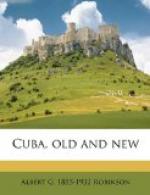His record of the landing place is obscure. It is known that he sailed some leagues beyond it, to the westward. While on board his caravel, on his homeward voyage, he wrote a letter to his friend, Don Rafael Sanchez, “Treasurer of their most Serene Highnesses,” in which the experience is described. The original letter is lost, but it was translated into Latin and published in Barcelona in the following year, 1493. While the Latin form is variously translated into English, the general tenor of all is the same. He wrote: “When I arrived at Juana (Cuba), I sailed along the coast to the west, discovering so great an extent of land that I could not imagine it to be an island, but the continent of Cathay. I did not, however, discover upon the coast any large cities, all we saw being a few villages and farms, with the inhabitants of which we could not obtain any communication, they flying at our approach. I continued my course, still expecting to meet with some town or city, but after having gone a great distance and not meeting with any, and finding myself proceeding toward the north, which I was desirous, to avoid on account of the cold, and, moreover, meeting with a contrary wind, I determined to return to the south, and therefore put about and sailed back to a harbor which I had before observed.” That the actual landing was at or near the present port of Nuevitas seems to be generally accepted.
Columbus appears to have been greatly impressed by the beauty of the island. In his Life of Columbus, Washington Irving says: “From his continual remarks on the beauty of scenery, and from his evident delight in rural sounds and objects, he appears to have been extremely open to those happy influences, exercised over some spirits, by the graces and wonders of nature. He gives utterance to these feelings with characteristic enthusiasm, and at the same time with the artlessness and simplicity of diction of a child. When speaking of some lovely scene among the groves, or along the flowery shores of these favored islands, he says, “One could live there forever.” Cuba broke upon him like an elysium. “It is the most beautiful island,” he says, “that ever eyes beheld, full of excellent ports and profound rivers.” A little discount must be made on such a statement. Granting all that is to be said of Cuba’s scenic charms, some allowance is to be made for two influences. One is Don Cristobal’s exuberance, and the other is the fact that when one has been knocking about, as he had been, for nearly three months on the open sea and among low-lying and sandy islands and keys, any land, verdure clad and hilly, is a picture of Paradise. Many people need only two or three days at sea to reach a similar conclusion. In his letter to Luis de Santangel, Columbus says: “All these countries are of surpassing excellence, and in particular Juana (Cuba,), which contains abundance of fine harbors, excelling any in Christendom, as also many large and




